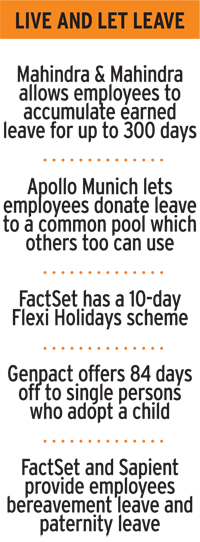Venkat R. Ramamoorthy is passionate about photography. So much that he took five days off from work in January and clubbed it with two weekends to attend a photography workshop in Rajasthan. Such ‘adjustments’ by employees sometimes irk bosses, but Ramamoorthy did not face any problems because FactSet India, the financial analytics company he works with in Hyderabad, offers employees a Flexi Holidays programme.
What this means is that it allows employees the flexibility of working on holidays such as Holi and Christmas and instead staying away on days of their choice – clubbing these days off with their casual or earned leave or even weekends. That’s what Ramamoorthy, Senior Manager for Administration and Facilities at FactSet India, did. “Flexi Holidays give us the freedom to avail holidays at the time of our preference,” he says. Ramamoorthy is now planning his next trip – to Ladakh – this summer.
The company, a subsidiary of US-based FactSet Research Systems Inc, is among a growing number in India which offer flexible leave as part of their effort to help employees maintain a healthy work-life balance. So, while companies cannot significantly increase the number of days of leave employees get, they are allowing employees to take breaks based on their preferences and requirements. “As the war for talent intensifies, employee benefits have gradually emerged as a powerful tool to attract and retain key talent,” says Anuradha Sriram, Director for Benefits at Towers Watson India. She cites the findings of a September 2013 survey by the global professional services company which found that 60 per cent companies in India planned to review their employee benefits strategies in 2014 at a time manpower costs are increasing. “We foresee companies moving away from the ‘one-size-fits-all’ approach to a more customised model by employing a robust benefits framework designed to meet the needs of a diverse workforce.”
The trend is most visible in local units of multinational companies or in sectors such as technology where the workforce is relatively young, educated and upwardly mobile. Vikas Awasthi, Managing Director, FactSet India, says the company also offers bereavement and paternity leave to its employees. Manika Awasthi Menon, Director for People Success at Sapient India, says the marketing and consulting company offers – apart from mandatory leave – additional maternity leave, paternity leave, bereavement leave, short-term paid and unpaid leave, and longer-term sabbaticals to employees. “People at Sapient are encouraged to take vacations and periodic reminders are sent to individuals and supervisors so that they don’t lose sight of this,” she says. “Innovative working policies have helped us boost retention.”
Many organisations are also allowing employees to accumulate more earned leave. Typically, employees at most companies can accumulate 30 to 90 days of earned leave which they can cash in equivalent to their last drawn salary when they quit. Automaker Mahindra & Mahindra (M&M) has, however, set the limit at 300 days. Also, employees must take privilege leave for 14 days a year to recuperate and pursue an activity they would not be able to do otherwise, says Prince Augustin, Executive Vice President for Group Human Capital and Leadership Development at M&M. “He/she could travel to the Himalayas, indulge in sporting activities or just chill out.”
M&M also offers an extra seven days off to employees who adopt a child, as well as six months leave on half pay to those suffering from a critical illness and have exhausted their earned leave. One employee who availed the six-month sabbatical from January to June 2012, is Ketan Doshi. Doshi, Vice President for Special and Strategic Projects at M&M, says he spent the time with his kids and in pursuing his hobbies such as travelling, photography, reading and paragliding. It was a relief to get only five emails a day during the sabbatical compared with 75 previously. “I was very refreshed after the break, especially because the 24 months prior to the sabbatical had been extremely hectic due to four major M&A [merger and acquisition] projects.”
Genpact, the Gurgaon-based business process outsourcing company, also permits employees to go on sabbatical ranging from three months to a year to acquire new skills or pursue higher education, says Urvashi Singh, Vice President for Human Resources. There are a few riders, though. The sabbatical is without pay and the employee concerned must have worked at least three years with the company, with a good performance record. It also allows single people who adopt a child to stay home for up to 84 days.
Another perk some companies are offering is pooling of leave. Says Asim Handa, CEO of recruitment and staffing company Gi Group India: “Leave is pooled instead of categorising it separately as casual, personal, medical or earned. Employees can take leave at their convenience,” he says. The company has been providing this facility for more than 10 years, he adds.
At Apollo Munich Health Insurance, employees can also donate leave. The programme allows employees to voluntarily transfer accrued leave to a ‘leave bank’ that will then help co-workers avail this facility in emergency situations such as hospitalisation of a family member or an accident. There are other adjustments. “Where leave in excess of a few days or weeks is required, we make a deviation by providing the work from home benefit, giving paid leave as well as adjusting from the next year’s balance,” says Sriharsha A. Achar, Chief People Officer at the insurance company. He says that about 30 employees, or three per cent of its workforce, have used the pooling facility in the 35 months since the programme began. The facility ensures employees don’t lose their salary, which they would otherwise had done if they extended their leave beyond the 24 days of paid leave allowed. “It is fostering great camaraderie,” he adds.
Source: BusinessToday.in



